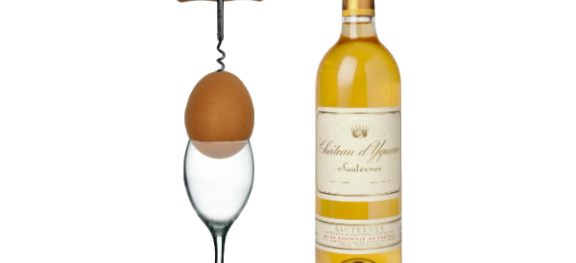Wine, eggs, and the tyranny of choice

The Round-The-Clock Coffee Shop in Macau offers scrambled, fried, poached or boiled eggs – but if you find it hard to choose between just four options (when surely one is un oeuf, as the old joke goes), then for goodness’ sake don’t ask for the wine list.
To be fair, the 16,800 different wines it offers are shared among the 13 other restaurants of the Grand Hotel Lisboa complex in Macau. And, thankfully, the 583-page list can be downloaded in advance, so you can decide in advance which of the 41 vintages of Dom Pérignon might go best with scrambled (1962 Oeneothéque, obviously). Or, if you prefer poached, which of their 172 Domaine de la Romanée-Conti cuvées would be most appropriate (altogether now: Montrachet 1973 – duh!)
Money no object? Yquem 1825 is yours for 400,000 pataca (£37,702 or $49,496) per bottle and is surely perfect with boiled eggs. On a budget? Mateus rosé is a mere 500 pataca (£47 or $62) and has the ideal gentle froth to go well with fried eggs.
By my reckoning, this is the largest wine list in the world, dwarfing the feeble 15,000 offered at La Tour d’Argent in Paris and the paltry 5,000 listed at London’s 67 Pall Mall – and because it’s the biggest, it must be the best. Right?
Whether more choice is a good thing in wine turns out to be an eggsistential question for the wine trade, and for 29-year-old Ben Revell of Winebuyers, one million pounds is riding on it.

For as long as the wine trade has existed, people have wanted to disrupt it. Wine is routinely accused of being abstruse, snobbish and undemocratic – and is often guilty as charged, as the above paragraphs about egg-matching capably demonstrate. Surely the bloated world of wine is ripe for the pricking by someone idealistic and determined enough?
(An aside: ten and a half years ago, I enthusiastically told a prospective employer that I was ‘on a mission to democratise wine and bring it to the people’. She waved her hand dismissively and said ‘oh, everyone wants to do that’ – but gave me this job anyway.)
Winebuyers aims to become the ‘ultimate online destination’ for wine, according to founder Ben Revell. He has raised £1 million on that premise, half of which came via crowdfunding platform CrowdCube. As a young entrepreneur from outside the wine industry, he has the sort of untarnished perspective that sees the potential for innovation.
That innovation comprises several parts. The first is an e-commerce platform that aggregates hundreds of suppliers, but holds no stock itself. Secondly, Winebuyers add no mark-up, instead charging a monthly subscription fee to their suppliers. Thirdly, they have developed clever software that automatically scrapes the websites of their suppliers and pulls all the relevant data into the Winebuyers platform.
The result is that Winebuyers already lists almost 30,000 wines from 38 different countries and has the ambition to ‘quickly become the largest online shop for wines anywhere in the world.’
In fact, by numbers alone, they probably already are. The closest competitor I could find in the UK is Hedonism, who list just under 6,500 products, or Grau in Spain with 9,500.
But the nagging question remains: is increased choice always better for wine?

One big advantage of Winebuyers is that it provides a single destination for a huge array of wine, with no premium to pay. It was originally aimed at fine-wine customers, but now has a wider remit, including ‘baby boomers, young mums and more engaged consumers', according to Revell.
But the drawbacks of a supersized selection become apparent as soon as you use it – and they are the same issues that have dogged the wine world since time immemorial.
The landing page above lists a bewilderingly disparate range of products: Château Latour 2010 Pauillac at £920.15 per bottle, then Argenteria, Lavinia Maria 2011 IGT Toscana at £866.93 (clearly a bug in the price), shortly followed by a 1934 Madeira, an Armagnac, and a rehoboam of tawny port. As users interact with the site, the wines displayed will apparently become more relevant via machine learning, although this relies on the efficacy of the AI involved – see last month’s Spittoon for my thoughts on that subject. Either way, as a first impression, it's a little bewildering.
However, the site offers extensive search functionality to help people find what they’re looking for, but much of this must be a work in progress. Selecting ‘Indian food’ from their food-matching menu suggested two vintages of Krug, several Riojas, an XO rum, and a 6-Puttonyos Tokaji, among others, which are hardly conventional choices for curry.
Meanwhile, searching for specific products unleashes that scourge of wine databases around the world, the duplicated listing. There are three separate entries for Nyetimber Classic Cuvée, for example, each from a different retailer at different prices. Whereas searching for Prosecco returns 90 different results in a jumble of styles (frizzante, spumante, brut, extra dry, etc etc), formats (from miniature to magnum) and prices (from £5.20 to £86.40).
How does the average Prosecco shopper choose from so many options, many of which are significantly different from each other? This is the crux of the problem – not just for Winebuyers, but for everyone interested in wine.

Others have tried to address this same problem with varying degrees of success. Mr Vine was an ambitious British app (disclaimer: I was briefly part of their tasting panels) that offered an all-in-one mobile e-commerce platform for existing wine retailers. It was released in 2015, but folded within three years. Back in 2010, Slurp aimed to be ‘the Amazon of the wine world’. In May 2011, it had ‘ambitious expansion plans’ but by June 2013 it was in administration (the brand was subsequently bought by wholesaler S H Jones and now represents their retail operation).
On the other hand, companies such as Vivino and Naked Wines show how canny use of technology paired with an unstuffy ethos can become hugely successful, appealing both to casual and engaged consumers alike.
The concept behind Winebuyers is a good one, although Revell admits, ‘it’s a challenge trying to be all things to all people. We aim not to overwhelm with choice, but offer variety. With just a few variables we can suggest wine our members might like, and the more feedback we receive, the more accurate our suggestions become.’
But the fundamental issue they face remains the same stubborn problem facing the Round-The-Clock Coffee Shop in Macau, and the wine industry in general. Is it better to offer more and more choice, or have a smaller, more tightly curated list?
With an average of six new suppliers currently being added every day, Winebuyers are clearly aiming for the former. Perhaps their attitude is exactly what the wine trade needs to shake things up and chart new territory. Or perhaps, no matter how many wines there are to choose from, you still need an expert to assure you that the best thing to go with eggs is a nice cup of tea.
Become a member to view this article and thousands more!
- 15,413 featured articles
- 274,243 wine reviews
- Maps from The World Atlas of Wine, 8th edition (RRP £50)
- The Oxford Companion to Wine, 5th edition (RRP £50)
- Members’ forum
- 15,413 featured articles
- 274,243 wine reviews
- Maps from The World Atlas of Wine, 8th edition (RRP £50)
- The Oxford Companion to Wine, 5th edition (RRP £50)
- Members’ forum
- Commercial use of our Tasting Notes
